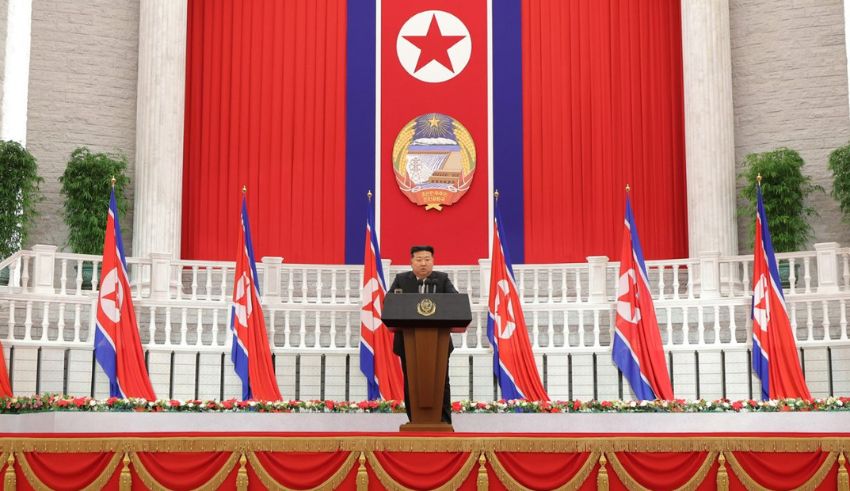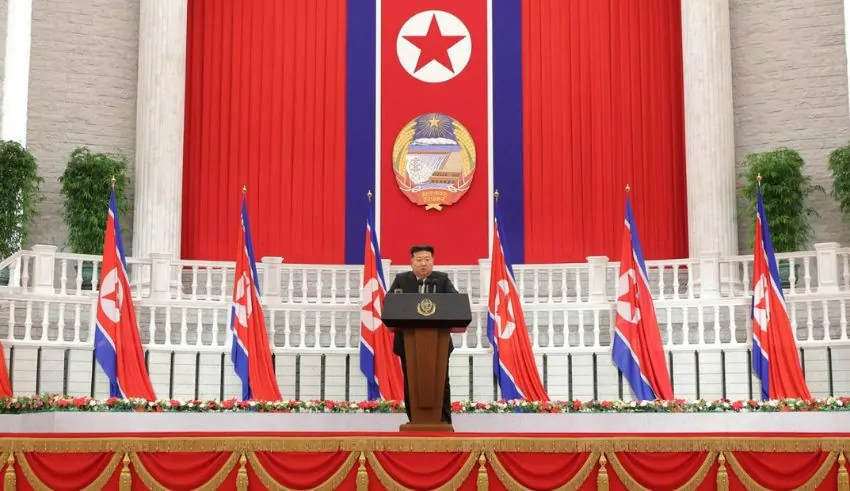

(C) NKAAL/X
Reiterating his dedication to growing the nuclear weapons of North Korea, Kim Jong Un, the country’s leader, promised to redouble efforts to equip its nuclear forces for war against the United States and its allies. Kim said these things, according to North Korean official media, during a speech honoring the country’s founding’s 76th anniversary.
In his speech, Kim called the dangers presented by the United States and its allies “grave,” implying that nuclear readiness would take front stage in North Korea’s military approach. The comments come at a period when tensions between North Korea and the world community are once more rising. Kim’s promise to greatly raise the nuclear weapons capacity of his country indicates the continuous dedication of his government to military might and deterrent.
His speech emphasizes the need of North Korea’s nuclear arsenal as the ultimate guarantor of its sovereignty and survival, therefore supporting the view that a strong and well-prepared military is indispensable to fight the supposed foreign threats.
Managing Regional Threats and U.S.-Led Military Alliances
Kim’s speech detailed North Korea’s perspective that a “nuclear-based military bloc” headed by the United States poses an increasing threat to the country. Apart from the United States, this supposed block comprises its regional allies, South Korea and Japan, who have kept close military relations with Washington. Kim claims that the development of this bloc seriously compromises North Korea’s national security and calls on the nation to quicken its nuclear bomb program.
North Korea has to not only increase its nuclear capability but also make sure its armed forces are always ready, he underlined. Kim said that this preparedness would help the nation to “at any given time” use its nuclear weapons in reaction to outside dangers. Although North Korea has often spoken similar remarks regarding enhancing its nuclear capacity, given the date and larger geopolitical background, this current declaration is seen by experts as very alarming.
Enhanced Nuclear Readiness Among Rising Tensions
Kim Jong Un went farther in his address underlining the need of North Korea greatly enhancing its nuclear capability. He urged the military to not only create additional nuclear weapons but also guarantee that the nation’s arsenal is completely operational and ready for instant deployment.
He underlined that maintaining the “security rights of the state” depends on this higher level of nuclear preparedness and that North Korea’s military forces—especially its nuclear ones—must be totally ready for battle. Although Kim Jong Un has made similar pledges in the past, his most recent comments are thought to be a part of a more general plan to show might in the face of mounting worldwide community pressure.
Recent activities of North Korea, including ongoing military drills and missile testing, point to the government’s will to show its military might in order to discourage possible enemies. Analysts say Kim’s address is meant to convey to the US and its allies that North Korea would not waver in its nuclear aspirations.
Future Weapons Test Speculation
Kim’s most recent promise to enhance North Korea’s nuclear capabilities comes as analysts from across the world conjecture that the government would carry out fresh bomb tests in preparation for the U.S. presidential contest in November. Although North Korea did not plan any significant military demonstrations to commemorate the 76th anniversary of its founding, many experts believe that Kim’s government could use future weapon tests to project its stance on the world scene and acquire leverage in any possible negotiations with the United States.
Pictures of Kim Jong Un looking at a big missile launch vehicle during a visit to a munitions facility have lately been published by North Korea’s official media. Believed to be the biggest ever seen by North Korea, the missile launcher has caused questions among defense experts about possible preparation for testing fresh long-range missile capability by the government.
Though it has underlined the U.S. commitment to closely working with South Korea, Japan, and other regional partners to maintain security and deter possible threats, the Pentagon has refrained from offering a particular assessment of North Korea’s missile capabilities in face of these concerns.
Renewed Protests Against US.-South Korean Defense Policies
Resuming their symbolic protest against the U.S.-South Korean military policies inked in July, North Korea has been releasing balloons carrying garbage across the border into South Korea in recent weeks. The new rules are meant to let U.S. nuclear weapons mix with South Korean conventional forces, therefore enabling a more coordinated reaction to mounting North Korean threats.
The accord is a component of a larger initiative to strengthen South Korea’s defense capacity and guarantee that the United States and its allies are ready to neutralize any possible nuclear threat from Pyongyang. < North Korea, on the other hand, has denounced the defense policies since it sees them as part of a bigger scheme to compromise its sovereignty and provide foundation for an invasion.
Pyongyang has charged the United States and South Korea of leveraging these accords to support military force expansion in the area, therefore aggravating tensions and raising the possibility of conflict. Officials from the United States and South Korea have frequently refuted these charges, contending that the defense policies are mostly defensive in character and meant to stop North Korea from becoming aggressive.
North Korea’s Developing Cooperation with Russia
Apart from the continuous conflicts with the United States and South Korea, North Korea’s developing ties with Russia has also started to cause West-based worries. Recently, Russian President Vladimir Putin paid a well-publicized visit to North Korea, the first one by a Russian official in 24 years. Putin and Kim Jong Un inked a fresh cooperation pact during the visit; several analysts have characterized this as part of an evolving anti-Western coalition.
In Western cities, this cooperation has caused concerns since it signifies a strengthening of links between two nations that have been progressively isolated by foreign sanctions. Particularly if it results in more military collaboration between the two countries, some observers think the North Korea-Russia alliance might have major effects on regional security.
Defense Meeting of South Korea with United Nations Command
South Korea has set a defense ministerial meeting with UN Command (UNC) member states in response to the escalating dangers from North Korea. Particularly along the demilitarized zone (DMZ), separating North and South Korea, the UNC, under the direction of American troops stationed in South Korea, is in charge of preserving peace and security on the Korean Peninsula.
The conference is supposed to center on strategies to improve regional security and handle North Korea’s escalating nuclear capacity’s problems. Significantly, Germany lately became a member of the UNC, the last nation to promise to defend South Korea should a war break out. North Korea, on the other hand, has denounced Germany’s admission into the U.S.-led border monitoring force and attacked the UNC as a “illegal war organization” claiming it will only heighten peninsula tensions.
Technology Obstacles for Long-Range Missiles from North Korea
Although North Korea has advanced its missile capability, many analysts think the nation still has great difficulties creating long-range nuclear missiles able to reach the American continent. North Korea has not yet shown that it can use intercontinental ballistic missiles (ICBMs) with the range and accuracy required to directly threaten the United States, even although it is believed to have missiles that can attack important sites in South Korea and Japan.
Still, the world community worries about North Korea’s ongoing attempts to improve its missile capacity. The regime’s will to overcome these technological obstacles and growing nuclear arsenal imply that North Korea is still dedicated to acquiring the capacity to attack its enemies with nuclear weapons. Future missile tests and higher regional tensions loom big as Kim Jong Un’s government advances with its military aspirations.
The Chinese Coast Guard ships extended their stays near the Senkaku Island region which led Japan to lodge formal diplomatic…
Numbeo reports in the 2025 Safety Index that the United Arab Emirates (UAE) has become the second safest country in…
Thailand’s automobile sector remains heavily challenged as car output during February 2025 dropped 13.62% year on year to 115,487 units.…
The Canadian Security Intelligence Service (CSIS) has officially warned about foreign entities trying to change election results on April 28th.…
Samsung Electronics CO-CEO Han Jong-hee has passed away suddenly after suffering a heart attack, as announced Tuesday. The sudden demise…
The Japanese market for mergers and acquisitions now allows unsolicited acquisition offers due to recent Ministry of Economy Trade and…
This website uses cookies.
Read More